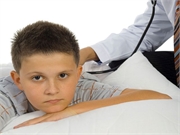- Could Your Grocery Store Meat Be Causing Recurring UTIs?
- Are You Making This Expensive Thermostat Error This Winter?
- Recognizing the Signs of Hypothyroidism
- 10 Strategies to Overcome Insomnia
- Could Artificial Sweeteners Be Aging the Brain Faster?
- Techniques for Soothing Your Nervous System
- Does the Water in Your House Smell Funny? Here’s Why
- Can a Daily Dose of Apple Cider Vinegar Actually Aid Weight Loss?
- 6 Health Beverages That Can Actually Spike Your Blood Sugar
- Treatment Options for Social Anxiety Disorder
Obesity Might Skew Blood Tests in Kids

If your child is obese, new research suggests that those extra pounds can alter the results of routine blood tests.
“We performed the first comprehensive analysis of the effect of obesity on routine blood tests in a large community population of children and found that almost 70% of the blood tests studied were affected,” said study first author Victoria Higgins, from the Hospital for Sick Children in Toronto and the University of Toronto.
Higgins’ team looked at more than 1,300 healthy children and teens in and around Toronto and found that obesity affected 24 routine blood tests, including those for liver function, inflammation markers, lipids and iron.
The study was published Dec. 17 in the Journal of Clinical Endocrinology & Metabolism.
“As clinical decisions are often guided by normative ranges based on a large healthy population, understanding how and which routine blood tests are affected by obesity is important to correctly interpret blood test results,” Higgins explained in a journal news release.
It’s unclear if obesity’s impact on blood tests are a sign of early disease, but doctors should be aware of these findings when interpreting several types of blood tests in children, the researchers advised.
“We hope our study results will assist pediatricians and family physicians to better assess children and adolescents with different degrees of overweight or obesity,” Higgins said.
There’s been a sharp rise in overweight and obesity among U.S. youngsters in the past three decades, and the childhood obesity rate is now about 18.5%.
More information
The American Academy of Family Physicians has more on childhood obesity.
Source: HealthDay
Copyright © 2026 HealthDay. All rights reserved.










